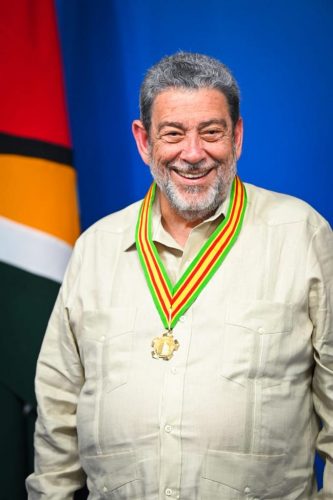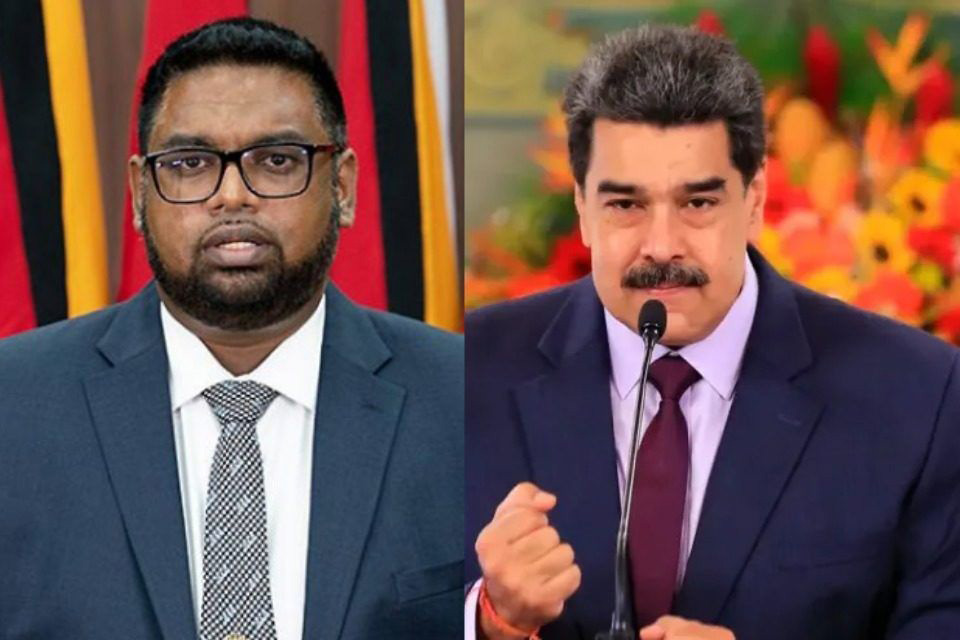President Irfaan Ali yesterday rejected claims in a letter sent by Venezuelan President, Nicolas Maduro to Vincentian Prime Minister, Ralph Gonsalves that the border controversy between the two countries is up for discussion.
“I, too, have a mandate from the National Assembly of Guyana which is unanimous in its resolve that the land boundary is not a matter for bilateral discussions and the settlement of the matter is properly in the International Court of Justice where it must remain until the Court gives its final ruling on the merits of the case which, Guyana has always said, and I repeat, will be fully respected by Guyana,” Ali’s letter to Gonsalves yesterday stated.
The President’s letter followed one sent by Maduro’s to Gonsalves on Monday, and which was posted on X, the former Twitter social media platform.

“I will attend the upcoming meeting with the mandate given to me by the Venezuelan people, who transparently voted in a consultative referendum convened by the National Assembly, setting soundly the next political and diplomatic actions, always within the framework of International Law, to defend our legitimate rights over Guyana Esequiba,” Maduro stated.
Referring to a referendum he had conducted and which analysts said had a lower than 10 per cent turnout, Maduro told the President Pro-Tempore of the Community of Latin American and Caribbean Countries (CELAC), “The Venezuelan people reasserted their rejection of the limits established in the 1899 Arbitral Award and reaffirmed the 1966 Geneva Agreement as the only way to reach a solution to the dispute.”
“Furthermore, Venezuela’s historical stance concerning the non-recognition of the binding jurisdiction of the International Court of Justice was ratified by the Venezuelan people, a sovereign position shared by 119 countries,” he contended.
Maduro also decried the role of the International Court of Justice (ICJ) in the process.
“The recourse to the Court that they attempt unilaterally to impose upon us contravening the commitment undertaken by the parties thereto precludes an effective solution to the dispute.”
However, Article 4 of the Geneva Agreement states, “If within a period of four years from the date of this Agreement, the Mixed Commission should not have arrived at a full agreement for the solution of the controversy it shall, in its final report, refer to the Government of Guyana and the Government of Venezuela any outstanding questions. Those Governments shall without delay choose one of the means of peaceful settlement provided in Article 33 of the Charter of the United Nations.”
“(2) If, within three months of receiving the final report, the Government of Guyana and the Government of Venezuela should not have reached agreement regarding the choice of one of the means of settlement provided in Article 33 of the Charter of the United Nations, they shall refer the decision as to the means of settlement to an appropriate international organ upon which they both agree or, failing agreement on this point, to the Secretary-General of the United Nations. If the means so chosen do not lead to a solution of the controversy, the said organ or, as the case may be, the Secretary-General of the United Nations shall choose another of the means stipulated in Article 33 of the Charter of the United Nations, and so on until the controversy has been resolved or until all the means of peaceful settlement there contemplated have been exhausted.”
The mixed signals over the meeting could jeopardise and put Gonsalves under pressure to salvage it.
ExxonMobil
Assailing the US oil major ExxonMobil and the US Southern Command (USSOUTHCOM), Maduro proffered in the letter to Gonsalves on Monday that Washington was supporting Guyana and it was a threat to the border matter being resolved.
“Dear Ralph, this meeting will be precisely an opportunity for us to clear up the elements that have aggravated the dispute in recent years. In addition to the above-mentioned unilateral imposition, I would like to note the arrogant and illegal attitude of the U.S. oil transnational Exxon Mobil, which has been the recipient of oil concessions in a maritime area yet to be delimited, in flagrant contravention of International Law,” he said.
“I hope that this high-level meeting allows us to address the main threats to the peace and stability of our countries, particularly the meddling of the United States Southern Command, which has begun operations in the disputed territory, contrary to our intention to maintain Latin America and the Caribbean as a zone of peace, free of conflict, without interference from any interests foreign to the region,” he added.
Maduro is of the belief that the talks tomorrow will “be a starting point to resume direct talks between Venezuela and Guyana, which have been disrupted in recent years by a series of actions contrary to the spirit of the Geneva Agreement itself.”
Guyana has been adamant that there will be no bilateral talks with Caracas on this matter.
President Ali’s letter yesterday sought to disabuse Maduro of any hopes of such a meeting, although he pointed out that he was open for talks on overall peace in the region. “In their urging of an engagement between Guyana and Venezuela, the CARICOM Heads of Government further called for “a de-escalation of the conflict through an appropriate dialogue between the leaders of Venezuela and Guyana to ensure peaceful co-existence, the application and respect for international law and the avoidance of the use or threats of force. “It is this framework for the meeting to which I have consented and to which I remain committed,” Ali said, pointing to the CARICOM communique framework, released after a meeting of heads last Friday night.
He highlighted the inaccuracies contained in Maduro’s Monday letter one of which was that the meeting’s focus was “in order to directly to address the territorial dispute between Venezuela and Guyana.”
“In their urging of an engagement between Guyana and Venezuela at the meeting of CARICOM Heads of Government referred to above, the Heads called for ‘a de-escalation of the conflict through an appropriate dialogue between the leaders of Venezuela and Guyana to ensure peaceful coexistence, and the application and respect for international law.’ As was clearly established in that meeting and conveyed in the outcome statement, there is full support by CARICOM for Guyana in pursuance of the resolution of its border controversy with Venezuela through the process of the International Court of Justice,” Ali reminded.
He explained that on February 17, 1966, the Geneva Agreement was signed between the UK/British Guiana and Venezuela with this country becoming party to it upon attaining its independence. The Agreement, he noted, provided several mechanisms for Guyana and Venezuela to resolve Venezuela’s contention of nullity and invalidity of the Award by talks; failing which, the Agreement mandates the United Nations Secretary General to select a final means of settlement of the controversy. “That is the process that was scrupulously followed,” Ali reminded.
“To recap that process: during the entire period of the existence of the Geneva Agreement, there have been several tools utilised. These include four (4) years (1966 – 1970) of meetings through a Mixed Commission involving bilateral talks between Guyana and Venezuela, a twelve (12) year moratorium followed by twenty-eight (28) years. (1989 – 2017) of the Good Offices Process under the aegis of the United Nations Secretary General. That Process facilitated dialogue between the two sides on a resolution of the controversy in the presence of the Secretary General’s personal representative,” he related.
The President said that Venezuela has never offered any credible support or evidence for its contention of nullity and invalidity of the 1899 Arbitral Award which settled the boundary between then British Guiana and Venezuela. “Nor has it offered evidence to contradict the validity of the 1905 Agreement, signed by both parties, fixing the boundary along the line established in the 1899 Arbitral Award.”
He noted that to the contrary, “Between 1899 and1962, Venezuela accepted and recognized that boundary as the international boundary between the two States, as reflected in all official Venezuela maps published during this 60-plus year period. Indeed, it applauded the award, claiming as a great victory, the attribution of the mouth of the Orinoco River – which was understood by both parties as the most important territory in dispute – to Venezuela.”
The President reiterated that the Geneva Agreement of 1966, “provides assurances of a final settlement by vesting in the Secretary-General of the United Nations the authority” to choose the International Court of Justice as the means of settling the matter and that this has been done.
On Friday, CARICOM met at an emergency meeting at which it was decided that a push would be made for a meeting between Ali and Maduro.






